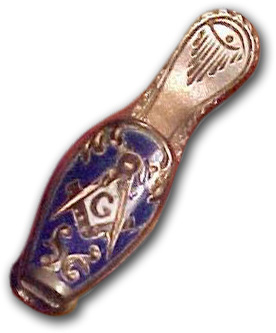Are you familiar with the Masonic blue slipper?
It is a small lapel pin in the shape of a blue slipper. Over the years it has been my habit to ask my wife and my daughters to wear one of these slippers on a coat or dress when traveling alone away from home.
Some 50 or 60 years ago, while I was still living at home, a widowed lady who was a cousin of my Dad's came to visit our home. She vacationed with us for several weeks every summer. She always wore this type of pin—The Blue Slipper. Her doctor husband was a Mason. The pin that she wore made a lasting impression on me. Through my curiosity and questioning, she told me it was a Masonic pin and served to identify her as a Masonic widow. She declared that Masonic men gave her extra attention while traveling, especially on the railroad (conductors, etc.).
To find out the meaning of this pin, let us go back in history to Boaz' time—the Book of Ruth. It will be remembered that Elimelech, his wife, Naomi, and their two sons, Mahlon and Chilon, fled to the land of Moab to escape the famine in their homeland of Bethlehem-judah. Things went well for a while. Then life fell apart for them. Elimelech died. The two sons married Moabite girls—Orpha and Ruth. Again tragedy struck. Mahlon and Chilon died. This left Naomi a widow in a foreign land with two widowed daughters-in-law from the land of Moab.
In time of trouble, people think of home and more importantly of God. Naomi found out that the famine back home had subsided, and there was grain and food again. So she confided with Orpha and Ruth that she would journey back home and be among her kinsmen.
Certain laws, rules, or customs governed her thinking at this time. Of first consideration was the fact that Naomi was too old to bear a son for her daughters-in-law to marry. Even if she could, the daughters-in-law would not wait for the son to grow up. So the girls should remain among their own people. The girls resisted and started to go with Naomi. Orpha was finally convinced she should stay in Moab. But Ruth remained steadfast and went with Naomi to her homeland.
Naomi and Ruth arrived back in Bethlehem-judah at harvest time. The Scripture passage on which this is based is well-known. "And Ruth said, Intreat me not to leave thee, or to return from following after thee: for whither thou goest, I will go; and where thou lodgest, I will lodge: thy people shall be my people, and thy God my God: Where thou diest, will I die, and there will I be buried: the LORD do so to me, and more also, if ought but death part thee and me." This passage of Scripture is unsurpassed as a declaration of love and devotion of one person for another. It has been said that it would make a good marriage vow. But, to me it is a different type of devotion.
Naomi also had to take into consideration another law. When Elimelech died, his next of kin was duty bound to redeem his possessions and take care of his widow and her family. Since Naomi was getting old, Ruth tried to earn a livelihood. While gleaning in the fields, she was seen by Boaz. And when he found out about her (that she was Naomi's daughter-in-law, etc.), he arranged special treatment for her. She could work with his girls in the field, and the young men were warned not to bother her. Since Boaz was not married and was kin to Naomi, Naomi decided that she should somehow make Boaz understand his duty to Elimelech's family. So Naomi advised Ruth to bathe and anoint herself and go to the threshing floor after dark and lay at the feet of Boaz. Boaz awoke at midnight and discovered her there. So as not to create a scandal, he gave her some barley and asked her to leave before dawn so that watching eyes would not recognize her.
Business among the tribe of Bethlehem-judah took place at the gate of the city. So Boaz sat down at the gate the next day because he knew there was a kinsman more closely related to Elimelech than he. So when the kinsman came by, Boaz called him aside and asked 10 men of the elders of the city to sit with them. Boaz bargained with his kinsman. The kinsman said he would redeem Elimelech's property. But, when he found out that he would have to take care of Naomi and Ruth, he reneged and told Boaz he would not redeem or protect Elimelech's interest. He would leave it to Boaz. The passage from Scripture for these events is the following: "And the kinsman said, I cannot redeem it for myself, lest I mar mine own inheritance: redeem thou my right to thyself; for I cannot redeem it. Now this was the manner in former time in Israel concerning redeeming and concerning changing, for to confirm all things; a man plucked off his shoe, and gave it to his neighbor: and this was a testimony in Israel."
So the kinsman drew off his shoe and gave it to Boaz. Boaz held it up for all in the gate to see. He asked them to be witnesses that he became Naomi's protector, Ruth's husband, and a redeemer of Elimelech's property. Thus, today we have the little blue slipper as an emblem of the protective influence of Masons for their wives, widows and daughters.
by Bro Clyde H. Magee, 32°
